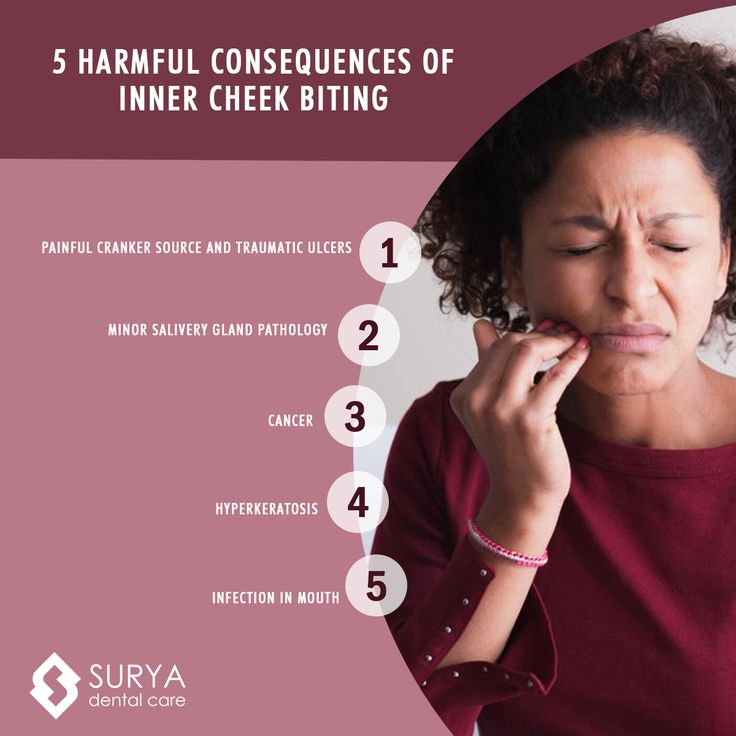Constantly Biting Inside Of Cheek

The habit of constantly biting inside of your cheek can be a frustrating and often painful experience. This behavior, also known as cheek biting or buccal biting, is more common than you might think, and it’s not just a matter of accidentally biting your cheek while eating. For many people, it’s a habitual behavior that can be triggered by a variety of factors, including stress, anxiety, boredom, or even certain dental issues.
One of the most significant concerns with constantly biting inside of your cheek is the potential for tissue damage and discomfort. The inside of your cheek is a sensitive area, and repeated biting can cause irritation, inflammation, and even lead to the formation of calluses or ulcers. In some cases, the constant biting can also lead to problems with your teeth, such as chipping or cracking, especially if you have a habit of biting down hard on your cheek.
So, why do people develop this habit in the first place? For some, it may be a nervous habit, similar to nail biting or hair twirling, that helps to calm anxiety or stress. Others may find themselves biting their cheek out of boredom or as a way to release tension. In some cases, cheek biting can be a sign of a more underlying issue, such as a misaligned bite or teeth grinding, which can cause uneven wear on the teeth and lead to discomfort in the jaw and face.
If you find yourself constantly biting inside of your cheek, there are several steps you can take to break the habit. One of the most effective strategies is to become more mindful of your behavior, paying attention to when and where you tend to bite your cheek. Keeping a journal or log can help you identify patterns and triggers, such as stressful situations or certain activities, that may be contributing to the behavior. Once you have a better understanding of your habits, you can start working on strategies to replace the cheek biting with healthier behaviors, such as chewing gum, eating sunflower seeds, or engaging in relaxation techniques like deep breathing or meditation.
In addition to these strategies, there are also several dental treatments and products that can help alleviate the discomfort and damage caused by cheek biting. For example, a custom-fitted mouthguard can help protect your teeth and cheek from further irritation, while desensitizing toothpaste or varnishes can help reduce sensitivity and discomfort. In some cases, dental work, such as orthodontic treatment or bite adjustment, may be necessary to address underlying issues that are contributing to the cheek biting.
To further understand the complexities of cheek biting, let’s take a closer look at some of the possible causes and effects of this behavior.
Possible Causes of Cheek Biting
- Stress and anxiety: For many people, cheek biting is a way to release tension and calm anxiety.
- Boredom: Cheek biting can be a habit that develops out of boredom or a lack of stimulation.
- Dental issues: Misaligned teeth, teeth grinding, or other dental problems can contribute to cheek biting.
- Nervous habits: Cheek biting can be a nervous habit, similar to nail biting or hair twirling.
Effects of Cheek Biting
- Tissue damage: Repeatedly biting the inside of your cheek can cause irritation, inflammation, and tissue damage.
- Discomfort: Cheek biting can lead to discomfort, pain, and swelling in the affected area.
- Dental problems: Cheek biting can contribute to problems with your teeth, such as chipping or cracking.
- Emotional distress: The habit of cheek biting can also cause emotional distress, especially if it’s a source of anxiety or embarrassment.
- Become more mindful of your behavior, paying attention to when and where you tend to bite your cheek.
- Keep a journal or log to identify patterns and triggers.
- Develop strategies to replace the cheek biting with healthier behaviors, such as chewing gum or engaging in relaxation techniques.
- Consider seeking professional help from a healthcare professional or dentist to address underlying issues.
- Practice relaxation techniques, such as deep breathing or meditation, to help manage stress and anxiety.
In conclusion, constantly biting inside of your cheek can be a frustrating and painful experience, but it’s not impossible to break the habit. By becoming more mindful of your behavior, identifying triggers, and developing healthier habits, you can overcome cheek biting and prevent further tissue damage and discomfort.
What are the most common causes of cheek biting?
+The most common causes of cheek biting include stress and anxiety, boredom, dental issues, and nervous habits.
How can I break the habit of cheek biting?
+To break the habit of cheek biting, become more mindful of your behavior, identify triggers, and develop healthier habits, such as chewing gum or engaging in relaxation techniques.
What are the effects of cheek biting on my teeth and overall health?
+Cheek biting can lead to tissue damage, discomfort, and dental problems, such as chipping or cracking of the teeth. It can also cause emotional distress and anxiety.